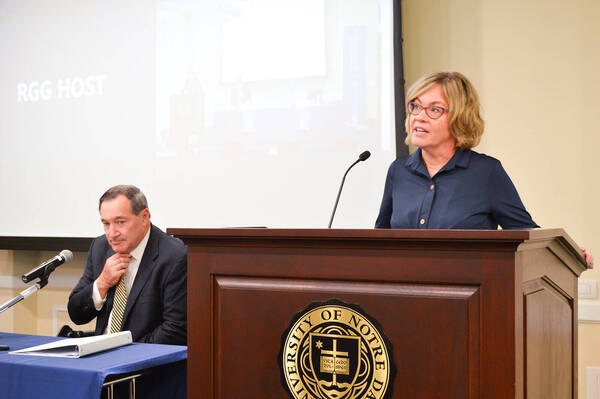
Pius XII, who reigned as pope between 1939 and 1958, has long been the subject of lively speculation, especially regarding his treatment of Europe’s Jews during World War II. New scholarship is casting light on other important themes as well, including that of the Vatican’s role in American foreign policy during the Cold War. At Notre Dame’s Rome Global Gateway in the shadow of the Colosseum, an international cohort of historians met in November 2022 to discuss the complicated nature of this “Vatican-Atlantic alliance.”
The conference papers revealed an intricate network of humanitarian agencies, intelligence services, and diplomats striving to establish, with Vatican support, America’s hegemony in the wake of World War II. Introduced to a dramatis personae of American prelates and laymen working behind the Iron Curtain, the audience was invited to appreciate how much the anti-communist struggle borrowed from Church rhetoric and resources. These characters included heroic nuncios living as quasi-prisoners in enemy territory, too fearful to leave the country lest they not be let back in. In a darkly humorous episode from Yugoslavia related by Massimiliano Valente (Università Europea di Roma), Josip Broz Tito toyed with the nuncio to Belgrade by having him wait an eternity outside his office in the company of Tito’s aggressive police dog, Tiger. The clergyman reported getting through it by anxiously praying the rosary. András Fejérdy (Pázmány Péter Catholic University) acquainted attendees with Franklin Roosevelt’s Irish Catholic lay advisor, Edward J. Flynn, who traveled to Moscow after Yalta for a tense few weeks of attempted rapprochement between the United States and Stalin. Similar stories borrowing from the spy thriller genre succeeded one another throughout the day as American priests boarded ships and planes from North Africa to Sicily to Bucharest and to all the ports of Europe, carrying money and documents, evacuating refugees, and writing state constitutions.
Although both the Vatican and the Americans spoke in the language of “crusade,” they did not share precisely the same goals. If the United States was trying to win the Cold War, the Church wanted the re-Christianization of Europe. The question mark in the title of the conference—“A ‘Vatican-Atlantic Alliance’?”—invited the audience to interrogate where the two parties fundamentally disagreed. It is certainly the case that Pius XII was a great admirer of America, an opinion partially developed from his 1936 visit to the United States as Cardinal Secretary of State Eugenio Pacelli. To illustrate this point, Roberto Regoli (Pontifical Gregorian University) cited a 1938 memorandum to the United States government in which Pacelli went so far as to characterize America and the Holy See as the “supreme moral powers of the world.”
But the pope was positively enraged that the United States would do business with the Soviet Union at Yalta and with Tito after he broke with Stalin in 1948. In 1944, the United States sent educational reformers to Italy, including the arch-secularist John Dewey, to cleanse the Italian school curriculum of the taint of fascism and to train the rising generation in the ways of democracy. Susanna De Stradis (John C. Danforth Center on Religion and Politics) evoked the frustration of Vatican official Monsignor Domenico Tardini as he furiously scribbled in the margins of a diplomatic exchange that “three anti-Catholic Americans” had been sent over to lecture Italians about liberty and democracy!
Europe finds itself once again in a great power conflict. Like an oldies station playing the classic hits, Cold War-style Manichaeism once again floods the airwaves. And once again, the American president and the pope share a great deal in common. But as U.S. Ambassador to the Holy See Joe Donnelly said in a speech that opened the conference, the two “do not always agree,” tacitly referring to the fact that Francis has distanced himself from the United States in his mediation of the Ukraine conflict. Unsurprisingly for a Latin American pope trained in liberation theology, Francis’ enthusiasm for U.S. power is somewhat more tempered than that of John Paul II and Benedict XVI. As this conference revealed, the Holy See’s vision of “the West” was in fact never the same as that of the United States. Meanwhile, despite the familiar barbarity of authoritarian dictatorships, the high moral tone of what is sometimes called the “rules-based international order” sounds increasingly out of tune in an era of declining American power. If history is any guide, understanding the moral contours of future great power conflicts will come from lucidly assessing those of the past. As Massimiliano Valente said of the recently opened Pius XII archive, “We are only at the beginning.”
Maxwell Pingeon is a doctoral candidate in religious studies at the University of Virginia.